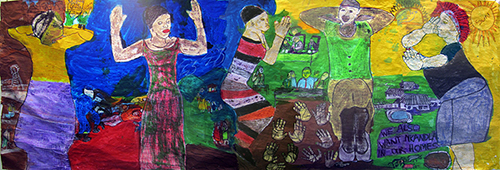Latest News Archive
Please select Category, Year, and then Month to display items
31 December 2019
|
Story Dr Cindé Greyling
|
Photo Anja Aucamp
 Dr Mariana Erasmus, SAENSE Platform Manager, says water remediation is vital for both the ecosystem and industries.
Dr Mariana Erasmus, SAENSE Platform Manager, says water remediation is vital for both the ecosystem and industries.
KovsieInnovation at the UFS supports innovative research outputs in various ways – one of which is to protect the intellectual property and to register patents where viable. This is in line with KovsieInnovation’s broader aim to create third-stream income for the university. Patent registration is a complex process and the UFS is proud to have the needed expertise to properly facilitate such an endeavour.
The SAENSE Platform
South Africa is a water-scarce country, with many water hungry industries (such as agriculture and mining). “Industrial processes often contaminate water with heavy metals, harmful chemicals, radioactive waste, and even organic sludge,” Dr Mariana Erasmus, SAENSE Platform Manager, explains.
Hence, water remediation is vital for both the ecosystem and industries. One of the key functions of the SAENSE Platform is to offer water-remedial solutions for the (bio)remediation of nitrates, heavy metals, and salts, among others. The platform’s activities and services are supported by undergraduate and postgraduate students and researchers, using Technology Innovation Agency (TIA) funding. TIA is a national public entity that serves as key institutional intervention to bridge the innovation chasm between research and development.
From waste to water
Through the joint effort of two mining companies and the UFS/TIA SAENSE Research Platform, a new treatment for mine drainage (MD) has been developed. This patented B-DAS (Barium – Dispersed Alkaline Substrate) technology effectively treats the major contaminants found in acid, alkaline, or neutral mining wastewater. The aim of the B-DAS system is to provide a passive water-treatment solution with minimum waste production; it can also be a potential pre-treatment for reverse osmosis (RO) to lower the requirements of the membranes and therefore potentially reduce the RO cost.
The success of the patent is that it turns unusable water into water that is fit for agricultural purposes at a reduced cost and increased efficiency.
Panel to discuss: 'Speaking wounds: voices of Marikana widows through art and narrative' on Monday 27 July 2015
2015-07-24
The massacre of 34 mine workers at Marikana on 16 August 2012 had South Africans in uproar. But what remained, after the razor wire was rolled up and the camera crews left, were 34 widows engulfed in silent despair. That was until the Khulumani Support Group introduced them to the transformative power of art and storytelling. In the last installment of the Vice-Chancellor’s Lecture Series for this year, a panel of speakers will discuss these widows’ journey with the theme of ‘Speaking wounds: voices of Marikana widows through art and narrative’.
Panel
The panel will consist of members from the Khulumani Support Group that include Dr Marjorie Jobson (National Director), Nomarussia Bonase (National Organiser), and Judy Seidman (Sociologist and Graphic Artist). Nomfundo Walaza, who is the former CEO of the Desmond Tutu Peace Centre, will be the respondent.
Details of the event:
Date: Monday 27 July 2015
Time: 12:00
Venue: Chancellor's Room, Centenary Complex, Bloemfontein Campus
RSVP: Nomusa Mthethwa at Nomusam@ufs.ac.za (Members of the public are welcome to attend.)
Body maps
An art exhibition consisting of body maps created by the widows will also be on display. These paintings quietly portray the turmoil of their inner landscapes, their perceptions of the massacre, and the impact these events had on their lives.

Collaboration
The lecture series is hosted by Prof Pumla Gobodo-Madikizela, Senior Research Professor in Trauma, Forgiveness, and Reconciliation Studies at the University of the Free State (UFS), as part of a five-year research project funded by the Andrew W. Mellon Foundation. This installment of the lecture series is presented in collaboration with the UFS Institute for Reconciliation and Social Justice.